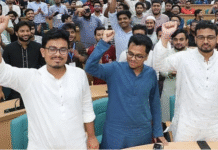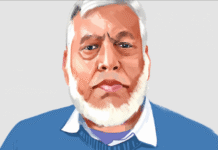Just before the Eid holiday, a new cartoon programme debuted in Pakistan. The show has provoked international attention for its startling heroine: the Burka Avenger, a teacher who dons a burka and uses karate to fight Islamic fundamentalists’ plan to shut her school for girls. The show addresses Pakistan’s lack of gender parity in education. What would the Burka Avenger fight for if she were Bangladeshi?
Gender parity, or making education equally accessible for males and females, has been a global issue for years. In Pakistan, implementation is uneven. Some provinces have achieved equality, such as Sindh, where there are more girls in school than boys. But in other areas, religious hardliners have pursued the shutdown of girls’ classrooms, and schoolboys far outnumber schoolgirls. The conflict can be brutal: last year the Taliban shot teenager Malala Yousafzai in retaliation for her activism promoting girls’ education. While the Burka Avenger cartoon was in development before the shooting, the violence illustrates why feminist messages about schooling are important in Pakistan.
Bangladesh, on the other hand, seems to have gotten the message already. The World Economic Forum’s 2012 Gender Gap Report, which measures equality for women and girls, ranked Pakistan 126th out of 135 nations on the measure of girls’ secondary school enrolment. In contrast, Bangladesh’s ranking on the same measure was number one. Here, gender parity favours girls.
On overall educational attainment, Bangladesh still ranked a lowly 118th. (Both genders dropout at high rates after age 15, and females’ university enrolment is lower than males’.) But this country lacks Pakistan’s conflict. Despite a Hifazat-i Islam platform proposing the dismantling of the country’s education policy and the Ministry for Women Affairs, denying girls’ education is not the precise agenda of any political or religious group.
If Bangladesh had a mild-mannered young lady who transformed herself into a superheroine under the cover of a burka, she might avenge something other than education. But what would that be?
It depends, of course, on what the Burka Avenger is all about – or, more precisely, what she is not about. The cartoon heroine is not an extremist or fundamentalist. She is not rejecting tradition (she wears a burka), although she is a modern woman (with a profession of her own). Although she acts to serve others, like every superhero, she is not a foreigner from outside the country. (Her home is in a village.) Nonetheless, the Burka Avenger responds to struggles that define her country from the viewpoint of the outside world.
The women of Bangladesh whose struggles have drawn most international attention are readymade garment workers. They could be called Bangladesh’s rough analogies to Pakistan’s Malala, because, like her, they have endured enormously disturbing violence (in the form of atrocities like the Tazreen fire and the Rana Plaza collapse). If the cartoon protagonist was Bangladeshi, she might be a garment worker.
Like the Burka Avenger, garment workers sometimes go out in purdah. As anthropologist Dina M. Siddiqi explained in a 2003 paper on sexual harassment in the garment sector, the workers use it as a way to advance gender equality. Siddiqi writes: “Paradoxically, entry into modern wage labor encourages women to take advantage of this so-called ‘traditional’ practice of female modesty.”
“Workers who shield themselves behind burkhas or ornas are at least given the benefit of the doubt by society,” she continues. “The social identities of female industrial workers continue to be suspect in the prevailing cultural environment.”
The consequences of a compromised social identity can be harsh. Of the 81 female interviewees in the 2003 paper, many reported suffering sexual harassment and violence from factory supervisors or strangers on the street. “Sometimes they act as though women are ripping the country right apart,” one woman said about the older men who openly harass and reprimand garment workers in the streets.
Of course it is not the country but rather the garment workers themselves who are sometimes ripped apart. In Tazreen and Rana Plaza, this was entirely literal. Reached by phone this weekend, Siddiqi noted how things had not changed since her research a decade ago: “In relation to Rana Plaza, the basic job insecurity that garment workers have [is still present]. They are locked into a structure in which if they do speak out they make themselves vulnerable…. This is why the workers at Rana Plaza did not feel the right to say “no” when owners pressurised them to work in the crumbling building.
International attention to the garment industry does not necessarily help advance empowerment, however. In a 2009 paper, Siddiqi quotes articles that compare workers to prostitutes in an effort to dramatize their troubles and prompt Westerners to “save” them. The inaccuracy can be a twisted replication of problems garment workers face in and around factories. (She calls this “a different kind of violence.”) Despite the moral issues their Bangladesh-made clothing may create for them, people in the West may be too geographically and culturally distant to know how to best support justice here.
In the Burka Avenger cartoon, too, empowerment does not come from a Western saviour. The heroine is a local woman. Like a garment worker, she uses the burka as a way to embrace modern living, avoid violent reprisals from her detractors, and fight for her own rights.
What goals would the Burka Avenger seek if she were a Bangladeshi garment worker? What concrete actions would she take? Siddiqi is more interested in structural changes than in the actions of a single person, but she recommends that, “Anyone who was hired would have an appointment letter, and the men and women who are responsible for Rana Plaza would be given exemplary punishment in public.”
There might be enough answers to that question to fill a whole TV series. How do you think a Bangladeshi Burka Avenger would seek justice?










